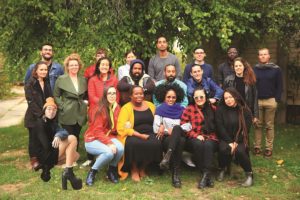Racism is deeply rooted in American institutions and life. Children begin early on to internalize messages about race from TV shows and other screen media, toys, books, what they see around them, and what they hear from adults and other kids.
Young children sometimes act out racist attitudes without understanding what they mean. Teachers I’ve worked with have reported encounters with exclusionary behavior (for example, a white child refusing to play with a Black child), or name-calling, or insisting that “we can’t have any brown princesses.”
The early childhood educators of color who I know (I am a white woman and former teacher educator) recommend addressing racist behaviors like these, not ignoring them. They point to research that shows the right kinds of interventions can produce positive changes in children’s perceptions of race.
There are many developmentally sound and creative ways to spark meaningful discussions with kids about race by using puppets, role playing, and stories that help children begin to develop awareness and sensitivity. For example, a teacher who hears a child call another child “Blackie” could bring two puppets to group time — one Black, one white — to act out this small scenario. Then she could ask the children: What happened here? What do you think about it?
The teacher would need to listen closely to the children’s ideas and choose follow-up comments and questions that connect to what they think, moving them toward understanding that racial name-calling is harmful. This would not be a one-time activity. It takes ongoing work to help children slowly build a meaningful understanding of racism.
Takiema Bunche-Smith, senior advisor at the Center on Culture, Race & Equity at Bank Street College of Education, says, “We need a systematic and clear approach to interrupting anti-Black racism and to center Black children in their full humanity and joy at the earliest of ages.”
Knowing how to do this kind of work with children requires a lot of professional development for teachers; rarely is anti-racism included in their “diversity” training. Data from the U.S. Dept. of Education reveal the effects of this deficit in teacher preparation: Black children are about three times as likely to be suspended from preschool as their white peers.
The current climate in the field of education is difficult and even threatening for teachers who choose to talk about racism. Since January 2021, anti-racist education efforts have been attacked as a version of Critical Race Theory (CRT), which was an academic construct developed in the 1940s and taught in law schools, not public secondary or elementary schools. As a result of such misguided accusations, 42 states have now introduced legislation or taken other steps to limit how teachers discuss racism in the classroom. Seventeen states have imposed bans and restrictions. And books that address racism have been challenged or banned in school districts in more than 30 states.
PEN America’s Index of School Bans lists banned books for every age group, beginning with books for young children such as Imani’s Moon by JaNay Brown-Wood and up through The New Jim Crow by Michelle Alexander, which is used in many high schools.
Middle-school and high-school teachers often use books as part of a larger curriculum that covers our history of racial injustice. But the burgeoning anti-CRT movement has made many teachers hesitate to cover their usual curricula. This is, of course, exactly what the movement to silence teachers is meant to achieve.
Those of us in early childhood education have remained off the radar of most anti-CRT agitators. This is probably because they assume that racism is not discussed in preschools and kindergartens. But with the rise of the Black Lives Matter at School movement, discussions among early childhood educators about racial justice have opened up. Teachers of color have helped many of us to see more fully how racial bias can be expressed even by young children.
As we begin a new school year, I am hoping that teachers of young children continue to go unnoticed by the anti-CRT movement. But I wonder how teachers will respond if there is increasing pressure to shut down talk about race with young kids at a time when many of us are realizing that we must begin early if we are to build a more racially just world.
Nancy Carlsson-Paige is professor emerita at Lesley University, author of Taking Back Childhood, and co-founder of Defending the Early Years (dey.org).


